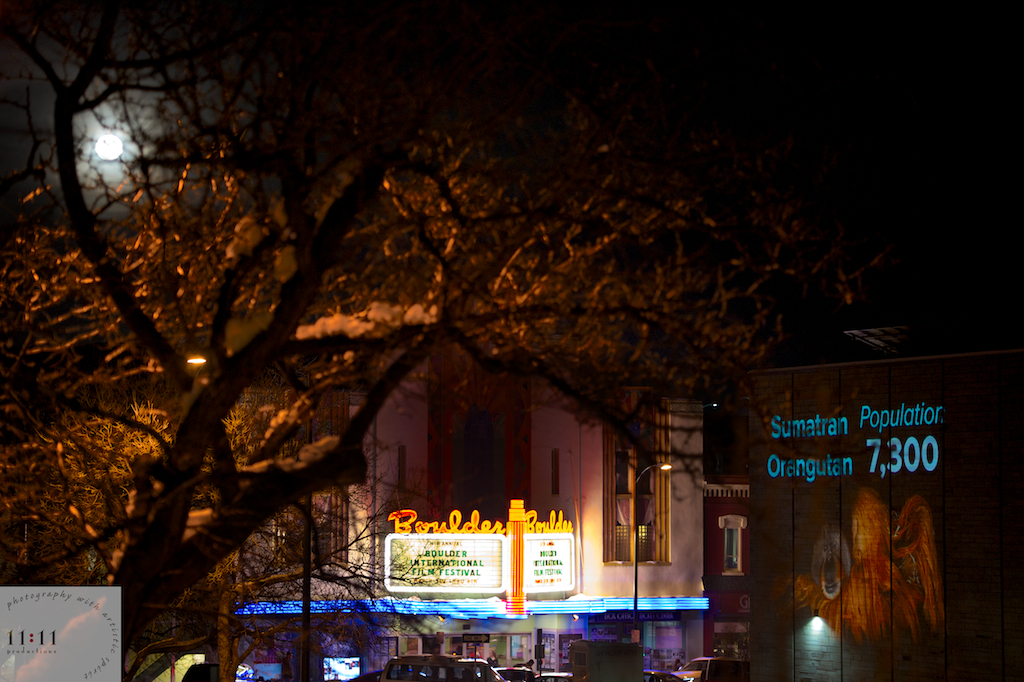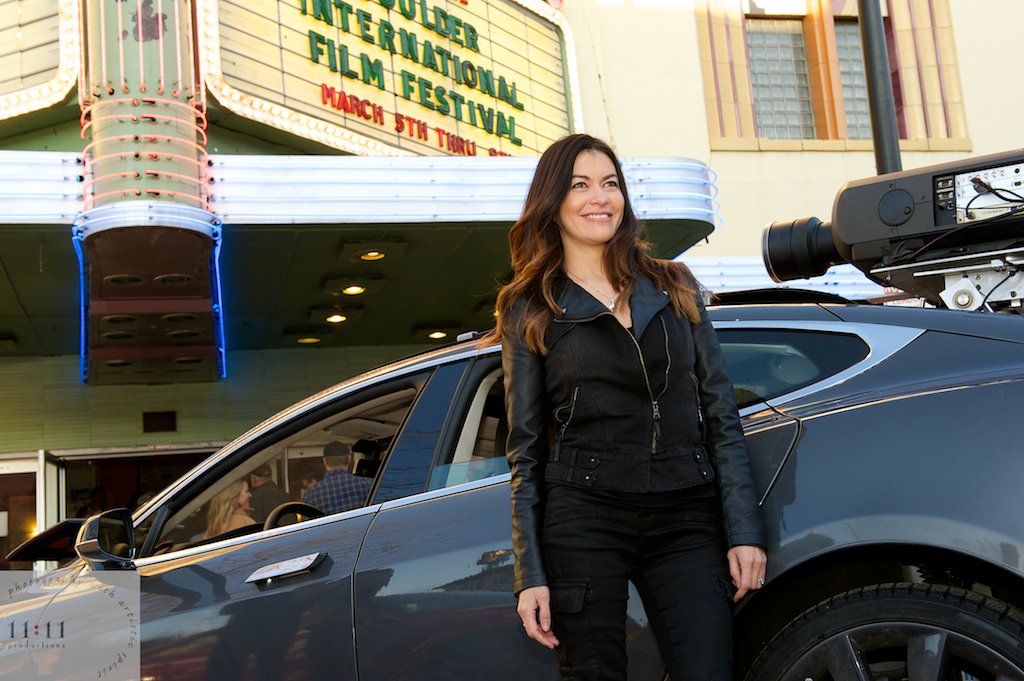What do a racecar driver, filmmakers, government officials, an online blogger, and a capitalist all have in common? They all traveled to Boulder this weekend for the International Film Festival and participated in a global town hall meeting to address climate change issues.
On Friday at 1 p.m., ETown Hall and the Boulder International Film Festival (BIFF) opened their doors to the community and discussed the very real effects of climate change and what part this issue will play in this year’s festival. A panel on stage, comprised of eight participants, discussed film’s role in this pressing issue, very close to many Boulderites’ hearts. In addition, three others participated via Google Hangout, tapping in from as far away as Hawaii and Wales.
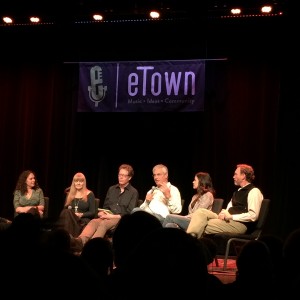 The participants hail from different niches and used their particular field of expertise to weigh in on the issue. Former Boulder Mayor Shaun McGrath and current administrator for the United States Environmental Protection Agency, discussed the issue of those who don’t want to acknowledge climate change in policy for fear of it infringing on big business in the corporate world. McGrath explained that this concern is a pure misconception, and with reducing emissions, the economy can thrive.
The participants hail from different niches and used their particular field of expertise to weigh in on the issue. Former Boulder Mayor Shaun McGrath and current administrator for the United States Environmental Protection Agency, discussed the issue of those who don’t want to acknowledge climate change in policy for fear of it infringing on big business in the corporate world. McGrath explained that this concern is a pure misconception, and with reducing emissions, the economy can thrive.
Hunter Lovins is the founder of a consulting non-profit, Natural Capitalism Solutions, which may seem like an oxymoron to most people. However, Lovins’ mission is to explain the economic rationale for making sustainable decisions. “I’m working to make a business case for fixing the issue of the climate crisis,” said Lovins.
While climate change seems to be a common buzzword in the news, Lovins has been paying mind to this issue for over thirty years. In 1981, she wrote, “Solving the CO2 Problem”. “Back then, it was a problem. Not the crisis that it is today,” Lovins remarked in her southern accent and black cowboy hat. She continued to explain that all of the smart, successful businesses today such as Apple and Google are implementing sustainable practices and renewable energy into their business plans. “Business, if you’re not doing this, you’re just stupid,” she said. The audience responded in laughter and applause.
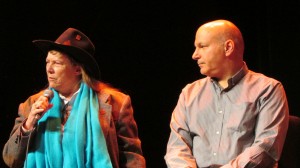 Jeff Orlowski, Louie Psihoyos, Lori Joyce and Candice Orlando offered the filmmakers’ perspective of climate action. Leilani Munter, climate change activist and the racecar driver featured driving the electric super-car in the movie “Racing Extinction”, commented that she was first inspired by Al Gore’s “An Inconvenient Truth,” but was left feeling helpless and asking herself, “now what?” Other panelists agreed with this sentiment.
Jeff Orlowski, Louie Psihoyos, Lori Joyce and Candice Orlando offered the filmmakers’ perspective of climate action. Leilani Munter, climate change activist and the racecar driver featured driving the electric super-car in the movie “Racing Extinction”, commented that she was first inspired by Al Gore’s “An Inconvenient Truth,” but was left feeling helpless and asking herself, “now what?” Other panelists agreed with this sentiment.
Psyhoyos, who directed the closing night film of the festival, ‘Racing Extinction’ believes films can inspire people to act more than words can. “Our goal was to get people to rise up out of their chairs and make them feel empowered and become an ally,” said Psyhoyos.
“Chasing Ice”, directed by Jeff Orlowski, aimed to make climate change a subject accessible and understandable to everyone. “We wanted to take the issue with the images that we have captured from satellites and make it truly tangible to audiences. We attempted to package this issue for the average layperson to understand,” said Orlowski. The filmmakers all attempted to make their films reach out to those who may not have the strongest understanding of climate change, and make it a real, impactful issue where the audiences are left feeling empowered rather than helpless.
Lori Joyce and Candace Orlando, co-directors of “Arise”, focused on women’s roles in climate change, a very under-reported phenomenon. “With ‘Arise”, we attempted to show a hopeful and inspiring message,” said Joyce. “Women are the nurturers and caregivers. We have that special connection to mother earth,” she continued. “The oil companies in Ecuador left behind unspeakable things that the communities pulled together to fix,” Orlando reflected.
In Boulder, this audience is one that is very aware of climate change issues. However, the panelists argued we must be reaching out to those who aren’t aware or accepting of these pressing issues. Munter is a racecar driver and her vegan, electric car lifestyle isn’t easily welcomed by the NASCAR community. However, she believes it is these people that need to have this exposure, more than anyone else. “We can’t go preaching to the choir and expect to create a global movement. If we do this, who will change the minds of those who don’t agree with us?,” asked Munter.
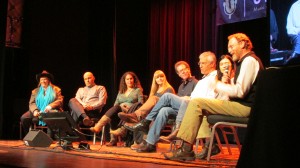 George Marshall, author of “Don’t Even Think About It, Why Our Brains are Wired to Ignore Climate Change,” participated through Google Hangout. He explained that our brains are wired to ignore a lot of incoming information. Otherwise we would be incredibly overwhelmed. “The most important signals our brain receives are those from the people we know,” Marshall remarked. However, friends aren’t constantly talking about climate change, and therefore politicians aren’t actively speaking about it, so the newspapers aren’t actively reporting on it. “It’s a socially constructed silence,” he continued.
George Marshall, author of “Don’t Even Think About It, Why Our Brains are Wired to Ignore Climate Change,” participated through Google Hangout. He explained that our brains are wired to ignore a lot of incoming information. Otherwise we would be incredibly overwhelmed. “The most important signals our brain receives are those from the people we know,” Marshall remarked. However, friends aren’t constantly talking about climate change, and therefore politicians aren’t actively speaking about it, so the newspapers aren’t actively reporting on it. “It’s a socially constructed silence,” he continued.
Before breaking out into small discussion groups, the panelists concluded with steps on how to deal with the pressing climate change issues. All participants urged the audience to use their voice and talk about these issues with their friends and neighbors. Psihoyos and Orlowski asked audience members to find their niche and use their skill set to get these points across. While film may be the vehicle for filmmakers, and articles for journalists, they promised we all have the potential to make that difference.

